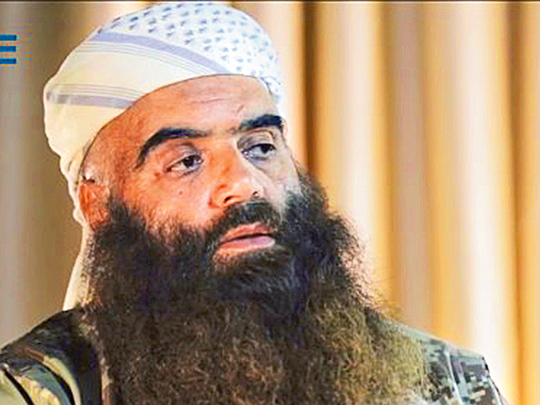
Beirut: A senior Al Qaida official was killed in air strikes on Sunday night that killed at least 21 other militants in Idlib province, an Al Nusra Front stronghold in northern Syria, according to monitoring groups.
The SITE Intelligence Group, which monitors militant websites, said Abu Firas Al Souri died in US strikes.
The Britain-based Syrian Observatory for Human Rights said the jets were thought to belong to the Syrian or Russian Air Forces. It added that they targeted the headquarters of Jund Al Aqsa, an extremist group that fights alongside Al Qaida’s Syrian affiliate, Al Nusra Front. He “was an old time Al Qaida member ... He was brought in from Yemen as an ideological counterweight” for Daesh, said Pieter Van Ostaeyen, a historian and monitor of Islamist militant groups.
“His death indeed is a blow for Al Nusra. However, that will not change a lot on the operational level,” he added.
According to the Syrian Observatory for Human Rights, Al Souri, his son and at least 20 fighters of Al Nusra and Jund Al Aqsa and other fighters from Uzbekistan were killed in strikes on positions in Idlib province.
Seven were high-ranking militants, the Britain-based Observatory said, adding that the Syrian air force had likely carried out the strikes.
A media outlet belonging to the Lebanese militia Hezbollah also said Al Souri’s son was also killed in the air strikes.
Hezbollah has sent thousands of its fighters to fight alongside Syrian government forces in the country’s five-year civil war.
The group was reported to have lost a dozen soldiers in fierce fighting in northern Syria last weekend as Islamist groups alongside rebel militias mounted an offensive against several government positions.
A temporary ceasefire between government forces and rebels has largely held since February 27, but it does not cover Al Nusra and Daesh.
The break has, in fact, allowed Russia and the US-led coalition that has been bombing Daesh in Syria to concentrate on their fight against both extremist and moderate rebel groups.
Al Nusra has generally kept a low profile since the truce brokered by the United States and Russia came into force.
But on Friday, the Al Qaida affiliate and allied rebel groups pushed regime loyalists out of Al Eis, a strategic town in the northern province of Aleppo, killing 12 members of the Lebanese Shiite Hezbollah movement.
“It was Al Nusra’s biggest operation since the ceasefire began,” Observatory chief Rami Abdul Rahman said.
Al Souri’s killing may even be a warning by the regime to Al Nusra against staging any more offensives in future.
Al Nusra’s rival Daesh has also lost a string of high-ranking members in recent weeks, mainly to strikes by the US-led coalition that launched an aerial campaign against the militants in Iraq and Syria in 2014.
On Wednesday, a drone strike near Daesh’s de facto capital Raqqa killed Tunisian commander Abu Al Haija, according to the Observatory.
Fifteen Daesh commanders accused of revealing his position have since been executed by the terrorist group, and the fate of another 20 men accused of collaborating with the US-led coalition remains unknown.
“This is the highest number of executions of security officials by Daesh,” said Abdul Rahman, whose Britain-based group has a wide network of contacts on the ground across Syria.
Also on Sunday, the army seized the city of Al Qaryatain, one of the last Daesh strongholds in central Syria, according to state television.
Daesh withdrew from the town a week after the Russian-backed army and allied militia scored a major victory in the ancient city of Palmyra, which is also located in the vast province of Homs.
The recapture of Al Qaryatain allows the army to secure its grip over Palmyra, where Daesh destroyed ancient temples during their 10-month rule and executed 280 people.
The army’s recapture of Al-Qaryatain has left Daesh with just one bastion in Homs province, Sukhna, where the focus of the fighting has now shifted.
About Al Souri
Al Suri, whose real name was Radwan Nammous, participated in a number of major military operations against Soviet forces in Afghanistan and Pakistan before transferring to Yemen in 2003. In 2013, the Al Qaida leadership transferred him to Syria to mend the growing rift between the group and Daesh.
Al Souri, born outside Damascus in 1949, followed the path of many Syrian Islamist militants. A graduate of the country’s military college, he trained militant cells in the country between 1977 and 1980, heading several operations against the authorities for the latter part of that period. He was expelled from the Syrian military in part because of his Islamist ties in 1979.
He fled to Jordan in 1980 then to Afghanistan in 1981 where he trained militants coming to the war-torn country from across Asia and the Arab world. He became an associate of Bin Laden and Abu Musab Al Zarqawi, a senior Al Qaida commander, who led the organisation’s affiliate in Iraq following the 2003 US invasion.












